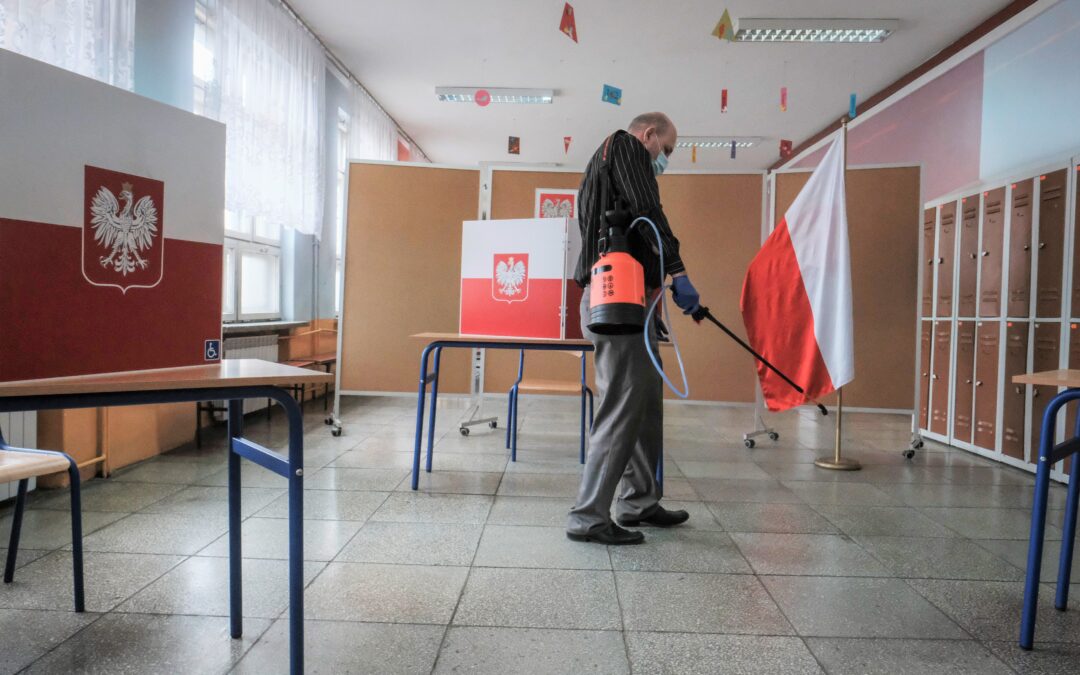By Anna Wójcik
Article 127 of the Poland’s constitution states that “the President of the Republic shall be elected…in universal, equal and direct elections, conducted by secret ballot”. The election on Sunday will not meet these criteria. This opens the way for the result to be overturned in court.
A state of natural emergency should have been declared
First, no elections should be held during a nationwide public health emergency such as the COVID-19 crisis. The constitution includes provisions that allow the introduction of a state of emergency during a period of natural disaster.
Article 232 of the Constitution reads:
In order to prevent or remove the consequences of a natural catastrophe or a technological accident exhibiting characteristics of a natural disaster, the Council of Ministers may introduce, for a definite period no longer than 30 days, a state of natural disaster in a part of or upon the whole territory of the State. An extension of a state of natural disaster may be made with the consent of the Sejm.
During the period of extraordinary measures and 90 days after their termination, no referendum or elections to the Sejm, Senate, organs of local government and presidency can be held. The government disregarded this obvious constitutional solution.
Kaczyński “cancelled” the 10 May election
The presidential election in Poland was meant to take place on 10 May. But, due to a decision made three days before the date of the planned elections by Jarosław Kaczyński, who holds no state office but is the powerful chairman of the ruling Law and Justice (PiS) party, the vote did not happen.
Kaczyński was persuaded to postpone the vote by Jarosław Gowin, who had resigned as deputy prime minister in protest against holding elections during the pandemic but remains leader of PiS’s junior coalition partner Agreement (Porozumienie).
Unsurprisingly, the constitution does not foresee the “cancelling” of elections by two MPs. After election day passed with polling stations closed, the National Electoral Commission announced that the conditions to hold the election on 10 May had not been met and that a new one should therefore be called.
Ewa Łętowska, a former Constitutional Tribunal judge, has expressed her opinion that: “After 10 May, since elections were ‘abandoned’ without any legal basis by the will of two party leaders, no new law regarding presidential elections will conform to the constitution.”
Changes to the electoral law
At the beginning of June, when new elections were called, the electoral law was substantially changed, allowing, among other things, for universal access to postal voting. But the Constitutional Tribunal ruled in 2011 that important changes to the electoral code less than six months before announcing the elections are prohibited.
The tribunal emphasised that this applies to changes regarding the organisation and date of elections that had been announced already, and to changes in the ways in which voters can exercise their right to vote. That judgement specifically concerned changes to electoral law such as voting by post or by proxy.
The tribunal also emphasised in an earlier judgement from 2009 that changes to the electoral code cannot be a way of taking advantage of extraordinary circumstances or be motivated by political outcomes. It also explained that changes to the electoral law in general should not be rushed, and should be preceded by a serious debate in parliament.
These requirements were not fulfilled in the legislative procedure that led to the most recent changes to the electoral code.
The Senate, where the opposition has a small majority, had sought to add amendments to the new electoral legislation to ensure that the elections were more fair. However, in the final vote in the Sejm, where PiS has a majority, these were rejected.
Among them was an amendment compelling public media to provide more pluralistic presentation of candidates, as they should already be required to do under the law.
Instead, state broadcasters have continued to effectively campaign on behalf of incumbent president Andrzej Duda. At last autumn’s parliamentary elections in Poland, OECD observers noted that public media bias undermined their fairness.
Another amendment would have given candidates standing in the new election at least 10 days to gather the required 100,000 supporting signatures. This was also rejected by the PiS majority, meaning that new opposition candidate Rafał Trzaskowski had just under a week to collect the signatures, far less than the 50 days that other candidates – who were allowed to carry over signatures from the “abandoned” election – had had.
The latter candidates were also allowed to spend leftover campaign money from the “abandoned” election on the new one. This and the advantage in collecting signatures contradicts the constitutional requirement for elections to be equal.
Not equal, universal, nor secret
In assessing if the presidential election fulfils the constitutional criteria of being universal and equal, the entire period of the electoral campaign must be taken into account.
The presidential election in Poland does not meet the criterion of equality. Due to COVID-19 restrictions in Poland, not all candidates had the possibility to present their candidacy to voters. The current president, Andrzej Duda, performed his duties and met with voters all over Poland. Moreover, he had a disproportionate share of time in public media, which are in fact a propaganda machine for the governing majority and its president.
The elections are also not universal because, due to various restrictions in different parts of the world, some Polish citizens abroad are denied their right to vote. Some did not receive their ballot on time, while in certain countries voting has been prohibited entirely by local authorities.
The rushed and chaotic organisation of the postal vote also casts doubts over whether the election meets the “conducted by secret ballot” criterion.
As a consequence, the presidential elections are constitutionally flawed, and this lack of legitimacy will stain whoever wins them.
Constitutional and political considerations
Holding presidential elections is a national prerogative and the EU has no legal grounds to challenge them. However, holding such elections will further hurt Poland’s democratic and rule of law credentials.
Many legal and electoral experts in Poland have nevertheless urged Poles to vote in the elections, arguing that what is at stake is the essence of Poland’s democracy.
Dozens of law professors signed a statement urging Poles to vote in clearly flawed elections: “Only citizens of Poland can resolve the current crisis. This is why we consider that conducting elections on 28 June 2020 may be a chance to bring constitutional order back in Poland…We all act in the state of a higher constitutional necessity.”
Former Constitutional Tribunal judge Mirosław Wyrzykowski put the Polish voter’s dilemma eloquently:
We are faced with a choice: either taking part in elections which are burdened with obvious unconstitutionality, or refusing to participate in the next stage of the destruction of the constitutional order. Everyone has to decide upon this issue for themselves: how they understand citizenship, and how they take responsibility for acts of commission or omission. Each voter must also decide what values he will be guided by when he makes that decision. Each of these two decisions will have its own serious justification. But these justifications will have their roots in different orders, the constitutional and the political.
Two other former Constitutional Tribunal judges, Łętowska and Jerzy Stępień, consider the vote on 28 June to be a “plebiscite” rather than an election.
The election could be invalidated
The fact that various aspects of the election violate the constitution opens the possibility for the result to be challenged.
The validity of elections is decided by the chamber of extraordinary control and public affairs, which was added to the Supreme Court by PiS as part of its judicial overhaul. This means that judges who were introduced to the Supreme Court by PiS – on the recommendation of the politically controlled National Council of the Judiciary and sworn in by Duda – will decide on the validity of the election, which PiS and Duda could seek to challenge on the basis of the unconstitutional changes they themselves made to the electoral code.
Main image credit: Piotr Skornicki /Agencja Gazeta





















